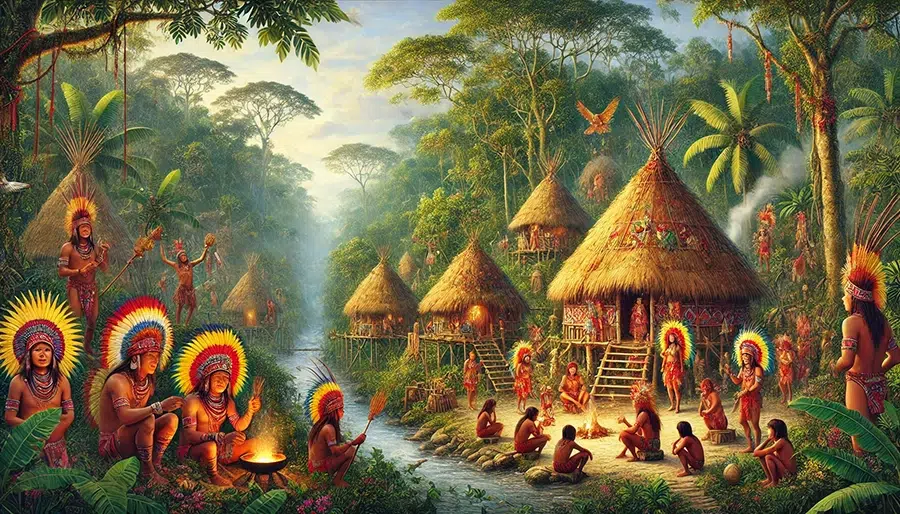Forest People, Shaneyawa
Guardians of the Amazon: The Rich Culture and Spiritual Traditions of the Shanenawa People
Inside the Lives of the Shanenawa: Stewards of the Amazon Rainforest
The Shanenawa people, whose name means “People of the Blue Bird,” are one of the many indigenous groups residing in the Amazon rainforest. Like many indigenous tribes, their culture, traditions, and worldview are deeply interconnected with the natural world, reflecting a profound understanding of and respect for the environment. Their story is a lens through which we can glimpse the broader narrative of Amazonian indigenous cultures—a rich tapestry of wisdom, resilience, and harmony with nature that has persisted for millennia.
Who Are the Shanenawa People?
The Shanenawa people live primarily in the state of Acre in Brazil, near the border with Peru. Their population is small, with estimates suggesting they number a few hundred individuals spread across several villages. Despite their small numbers, the Shanenawa maintain a vibrant cultural identity rooted in their spiritual connection to the land.
Historically, the Shanenawa were semi-nomadic, moving through the forest to hunt, fish, and gather fruits and medicinal plants. Over time, they established permanent villages, but their lifestyle remains closely tied to the rhythms of the rainforest. This connection shapes every aspect of their lives, from their dietary practices to their spiritual ceremonies.
The Spiritual World of the Shanenawa
Central to Shanenawa culture is their spirituality, which is deeply intertwined with the natural world. They believe in the existence of spiritual entities that inhabit the forest, rivers, and skies. These spirits, often referred to as guardians, are respected and honored through rituals, prayers, and offerings.
The Shanenawa use sacred medicines such as rapéh—a finely ground blend of plants and ashes blown into the nostrils—to connect with these spirits and access higher states of consciousness. This sacred snuff, shared across many Amazonian cultures, is a tool for cleansing, grounding, and opening pathways to spiritual insights.
Another critical aspect of their spiritual practices involves the use of Ayahuasca, a ceremonial brew made from the Banisteriopsis caapi vine and other plants. Ayahuasca ceremonies are guided by experienced shamans, who serve as intermediaries between the physical and spiritual realms. Through these ceremonies, the Shanenawa seek healing, guidance, and a deeper understanding of their purpose.
Language and Oral Traditions
The Shanenawa speak a Panoan language, part of a linguistic family shared by many indigenous groups in the Amazon. However, like many indigenous languages, it is endangered due to the encroachment of Portuguese and other dominant languages.
Their oral traditions play a crucial role in preserving their heritage. Elders pass down stories, songs, and chants that teach younger generations about their history, the spiritual significance of the forest, and the moral values that guide their community. These oral traditions are not merely entertainment; they are a living repository of knowledge about survival, medicine, and the intricate web of life in the Amazon.
Amazonian Indigenous Culture: A Broader Context
The Shanenawa are part of a larger mosaic of Amazonian indigenous cultures, each unique but united by shared values of environmental stewardship, spirituality, and communal living. The Amazon is home to over 400 indigenous groups, representing more than 300 languages. Together, these groups embody one of the most diverse and ancient reservoirs of human knowledge on Earth.
Indigenous people of the Amazon have traditionally lived in harmony with the rainforest, practicing sustainable methods of agriculture, hunting, and fishing. Techniques like shifting cultivation (also known as slash-and-burn farming) are carefully managed to ensure that the forest regenerates. Many tribes have an encyclopedic knowledge of plants, animals, and ecosystems, often surpassing that of modern scientists.
The Role of Sacred Medicines
Sacred medicines like Ayahuasca, rapéh, Sananga, and Kambo are integral to Amazonian indigenous culture. Each has a specific purpose, whether it’s physical healing, spiritual cleansing, or connecting with the divine. For the Shanenawa and many other tribes, these medicines are not merely tools but living entities imbued with spirit and intention.
- Rapéh: Often associated with grounding and focus, rapéh is a symbol of the sacred breath and a bridge between the physical and spiritual worlds.
- Sananga: Eye drops made from the roots and bark of specific plants, Sananga is used to sharpen vision and cleanse spiritual energy.
- Kambo: A secretion from the Giant Monkey Frog, Kambo is applied to the skin in a ceremonial context for detoxification and physical healing.
These medicines are not taken casually; their use is guided by strict protocols and deep respect. In many ways, they exemplify the indigenous worldview, which sees humanity as a part of nature rather than separate from it.
Challenges Faced by the Shanenawa and Amazonian Tribes
Despite their rich cultural heritage, the Shanenawa and other Amazonian tribes face significant challenges. Deforestation, illegal logging, and mining threaten their lands and way of life. The expansion of agriculture, particularly for cattle ranching and soy production, has led to widespread destruction of the rainforest, displacing indigenous communities and eroding their traditional territories.
Political and social pressures also undermine their autonomy. In Brazil, for instance, debates over land rights and indigenous protections have often left these communities vulnerable to exploitation. Encounters with modern society can bring diseases, alcohol, and other disruptive influences, further destabilizing their communities.
Globalization presents another challenge, as younger generations are often drawn to urban areas in search of education and economic opportunities. This migration risks diluting their cultural identity and knowledge.
The Role of Indigenous Activism
Despite these challenges, the Shanenawa and other Amazonian tribes are actively fighting to preserve their way of life. Indigenous leaders and organizations have become powerful advocates for environmental protection and cultural preservation. Through international alliances, many tribes have brought global attention to the importance of the Amazon rainforest—not just for their survival, but for the planet’s ecological balance.
The Shanenawa are among those who participate in these efforts, sharing their knowledge and traditions to inspire others. They have hosted cultural exchanges, welcomed visitors to their lands, and collaborated with NGOs to promote sustainable development.
Learning from the Shanenawa: A Global Perspective
The Shanenawa people offer profound lessons about living in harmony with the Earth. In a world increasingly dominated by consumerism and environmental degradation, their worldview serves as a reminder of humanity’s interconnectedness with nature.
Their sustainable practices, such as agroforestry and the use of medicinal plants, demonstrate that it is possible to meet human needs without destroying ecosystems. Their emphasis on community, reciprocity, and respect for the natural world challenges the individualistic and exploitative tendencies of modern society.
Preserving Indigenous Cultures: What Can We Do?
Supporting the Shanenawa and other Amazonian tribes requires collective action. Here are a few ways to contribute:
- Raise Awareness: Share their stories and amplify their voices through social media, education, and public discourse.
- Support Fair Trade: Purchase products like indigenous crafts and medicines from ethical sources that ensure fair compensation for their creators.
- Donate to NGOs: Organizations like Amazon Watch and the Rainforest Foundation work directly with indigenous communities to protect their lands and rights.
- Advocate for Policy Change: Push for stronger environmental protections and indigenous rights in national and international forums.
The Shanenawa people, along with the countless other indigenous tribes of the Amazon, are stewards of some of the most critical ecosystems on Earth. Their knowledge, resilience, and spirituality offer invaluable lessons for humanity at large. By recognizing their contributions and standing in solidarity with their struggles, we can help ensure that their cultures—and the rainforest they depend on—survive for generations to come.
In honoring the Shanenawa and their Amazonian kin, we also honor a deeper truth: that the fate of humanity is inextricably linked to the health of our planet. Through their wisdom, we may yet find a path toward a more balanced, respectful, and sustainable future.


